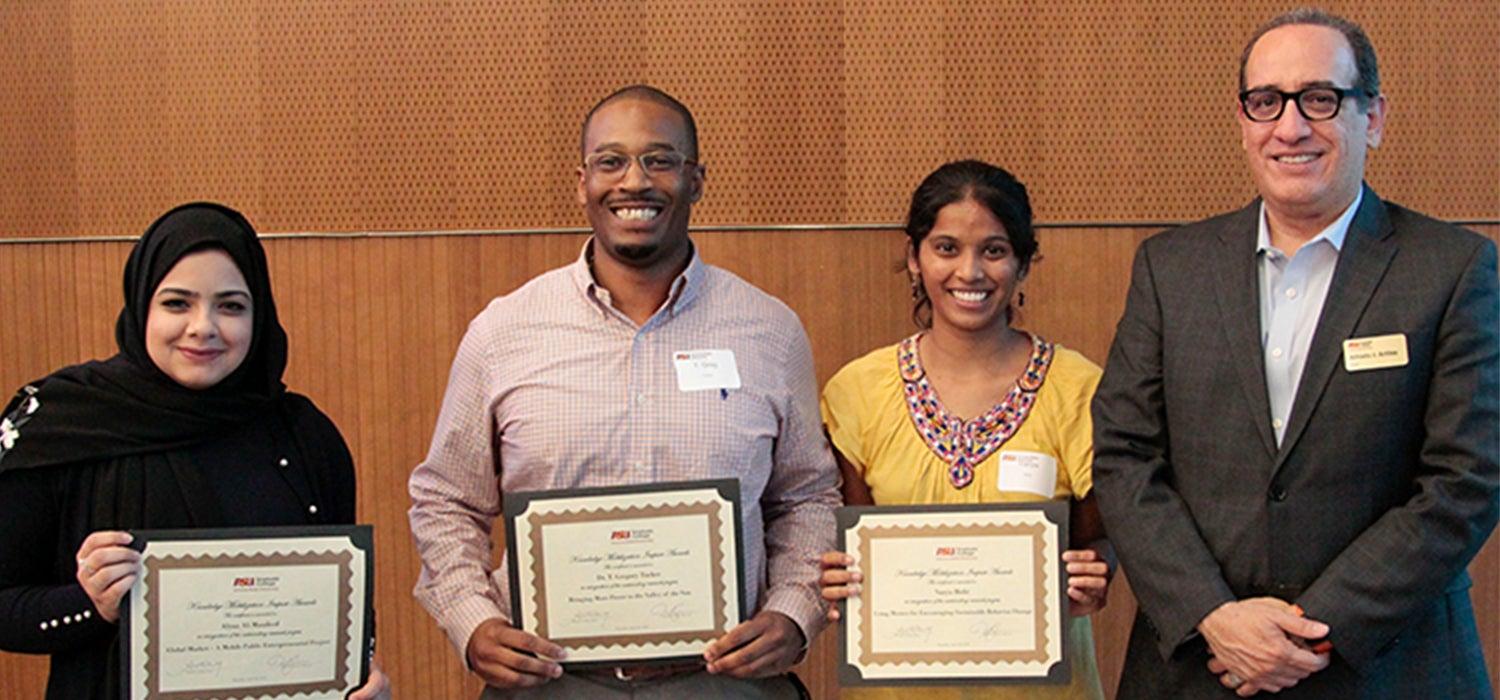
Announcing the recipients of the second annual Knowledge Mobilization Impact Awards
On Thursday, April 26, the Graduate College hosted its second annual Knowledge Mobilization Impact Awards. The award ceremony highlighted impactful, innovative research conducted by ASU’s graduate students and postdoctoral scholars. Awards were given for best master’s, doctoral and postdoctoral projects. The Knowledge Mobilization Impact Awards showcased what challenges scholars are tackling with their research, and how their problem-driven solutions are transforming research into actionable insights, useful products, or policy.
The Knowledge Mobilization Impact Awards program has grown dramatically since its debut, with nearly five times more applications received than last year.
“Awareness of knowledge mobilization as a practice and research tool is picking up,” said Jennifer Rhodes, program manager for knowledge mobilization initiatives within the Graduate College. “Having more applications certainly made the jobs of our judging panelists more exciting.”
This year’s winners were Alyaa Al-Maadeed from the School of Social Work in the master’s category, Vanya Bisht from the School for the Future of Innovation in Society, in the doctoral category, and T. Gregory Tucker from the School of Molecular Sciences in the postdoctoral category.
The awards ceremony featured three-minute videos, submitted by this year’s finalists, highlighting an array of high-impact research projects. A video showcasing last year’ participants Jesse Senko and Erica Soltero was also shown, and can be viewed on the Graduate College’s YouTube channel.
Participants spanned academic disciplines from STEM fields such as engineering and sustainability to humanities such as social work and education. Presentation topics ranged from increasing the public accessibility of archaeology to encouraging sustainability through social media to the creation of global-local enterprises allowing refugees to gain valuable work skills.
Research projects were reviewed by a panel of interdisciplinary faculty and industry/public sector leaders. The Graduate College awarded winners in the master’s, doctoral and postdoctoral categories travel/research funds in the amounts of $250, $500 and $800, respectively.
If you’re still not sure what knowledge mobilization means, the keynote speaker Dr. Andrew Maynard, director of the ASU Risk Management Lab and professor in the School for the Future of Innovation in Society, said it best, “How do you take knowledge out of somebody’s head and give it to [people] in a way they can actually use?” When you can answer that question for your research, you’ve mobilized your knowledge.
Maynard delivered a thought-provoking address on how hubris gets in the way of knowledge mobilization. Researchers may lack the ability to translate or apply their research to real-life issues and must exercise humility to mobilize their knowledge across disciplines to make an impact. Maynard provided 10 tips for mobilizing knowledge, which included knowing the target audience and putting them first, using language that makes sense to the audience, and actively listening to others.
Greg Tucker, winner of the award in the postdoctoral category, presented Bringing More Power to the Valley of the Sun, a project he is working on within the School for Molecular Sciences. Presenting his lab’s patented battery and fuel cell research in terms businesses and the general public could easily understand was an opportunity to communicate the technical intellectual property of the work to fellow researchers and local business owners.
“Knowledge mobilization is an efficient vehicle for individuals or teams to effectively relate their specific idea to another group for implementation,” Tucker noted.
By highlighting the importance of the technology in an easily accessible way, Tucker hopes to inspire a new generation of students and local scientists to adapt the technology to create new energy solutions for the Valley.
Vanya Bisht, award recipient at the doctoral level found knowledge mobilization to be an effective tool for social change at the local level – starting with her friends – for her project, Using Memes for Encouraging Sustainable Behavior Change.
Empowerment and action-based outcomes are an important element to knowledge mobilization to Alyaa al-Maadeed, recipient of the award in the master’s category. Presenting her proposal for Global Market: A Mobile Public Entrepreneurial Project, she was encouraged to see so many projects aimed at creating social solutions.
“As social workers,” she explained, “our ultimate goal is to empower all communities. Mobilizing a project such as the Global Market [allows] communities to address their own strengths and opportunities to empower themselves.”
With the award funding further development of her research project, she looks forward to taking her work into the community, working with communities and stakeholders to leverage her platform in ways to genuinely impact them.
For more information about the Graduate College’s knowledge mobilization efforts, visit the knowledge mobilization webpage.
More stories from the Graduate Insider

Graduate education is an adventure
About eighteen months ago, I set out on a journey walking the islands of the Dodecanese during a sailing trip in Türkiye and Greece with several friends. Along the way, I found winding paths, timeless villages and breathtaking views of sea and sky. That experience got me thinking about how adventure shows up in other parts of life, especially in learning.

Finding your flow: Managing the graduate writing process
Graduate writing can feel like a marathon—long, demanding, and full of unexpected detours. But as Tristan Rebe, Program Manager for the Graduate Writing Center, reminded students in the Grad15: Managing the Writing Process webinar, writing is not about perfection—it’s about progress. “The best dissertation is a done dissertation,” Rebe said, quoting Robert Frost: the best way out is through.
